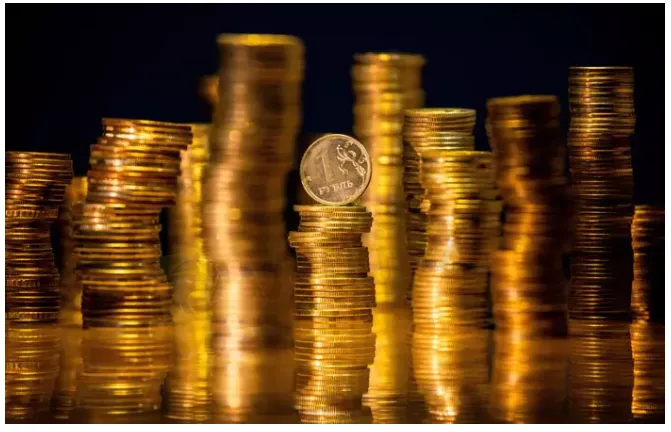简体中文
繁體中文
English
Pусский
日本語
ภาษาไทย
Tiếng Việt
Bahasa Indonesia
Español
हिन्दी
Filippiiniläinen
Français
Deutsch
Português
Türkçe
한국어
العربية
Rouble firms past 79 vs dollar, stocks down
Abstract:The rouble hovered around the 80 mark against the dollar on Monday, while stock indexes inched lower as the market lacked new momentum and watched developments around what Russia calls “a special military operation” in Ukraine.

The Ukrainian foreign minister said over the weekend there had not been any recent diplomatic communications between Russia and Ukraine at the level of their foreign ministries.
“The continuation of active fighting and a clear stalling of negotiations is the main risk for Russian assets through the risks of new sanctions,” said Dmitry Polevoy, head of investment at LockoInvest.
By 1114 GMT, the rouble had gained 1.1% to 79.10 against the dollar after briefly touching 78.80, its strongest since April 12. Against the euro, the rouble firmed 3.3% to 82.60, a level last seen on April 8.
This week the rouble is expected to trade within the range of 79-82 to the dollar and 84-87 to the euro, Rosbank analysts said in a note.
Fluctuations in the rouble are artificially limited by capital controls that Russia imposed in late February as its financial sector and economy have taken a hit from unprecedented western sanctions designed to punish Moscow for sending tens of thousands of troops to Ukraine on Feb. 24.
The rouble can encounter some downside pressure from the central bank, which is expected to lower its key rate from 17% at its next board meeting on April 29.
Russian Central Bank Governor Elvira Nabiullina on Monday said the bank will not try to tame inflation by any means, as this would prevent businesses from adapting to the new reality.
Nabiullina also said the central bank was considering making the sale of foreign exchange proceeds by exporters more flexible.
Russian authorities ordered export-focused companies convert 80% of their revenue into roubles in late February as part of capital controls that Moscow imposed as the rouble headed to all-time lows amid unprecedented Western sanctions.
“Before the market and geopolitics stabilise, the full cancellation of capital control measures looks premature,” Promsvyazbank analysts said in a note.
This month, the rouble could see support from tax payments as companies are due to pay a record 3 trillion roubles ($37.50 billion) in taxes, for which some export-focused companies need to sell foreign currency, according to analysts surveyed by Reuters.
On the stock market, the rouble-based MOEX Russian index fell 1.9% to 2,380.2 points, while the dollar-denominated RTS index shed 0.7% to 948.5 points.
Russian shares in Petropavlovsk, which is also listed in London, outperformed the market by gaining 2.5% following massive losses last week after the company said it was considering putting itself up for sale in the wake of sanctions on Russia and the risk of countermeasures.
The MOEX index is expected to decline towards 2,250 points, Finam brokerage said in a note.
($1 = 80.0050 roubles)

Disclaimer:
The views in this article only represent the author's personal views, and do not constitute investment advice on this platform. This platform does not guarantee the accuracy, completeness and timeliness of the information in the article, and will not be liable for any loss caused by the use of or reliance on the information in the article.
Read more

Indonesia officially joins the BRICS countries
Indonesia's decision to join the BRICS group will not only enhance economic cooperation within BRICS countries but is also expected to have a profound impact on global trade, investment, and the currency system.

Attention! Goldman Sachs Cuts Gold Target to $2910
As the Fed slows rate cuts, gold's price growth may be limited. Goldman Sachs revised its short-term forecast, expecting gold to reach $3,000 per ounce by mid-2026.

Inflation Rebounds: ECB's Big Rate Cut Now Unlikely
German inflation has surged once again, exceeding the 2% target for the second consecutive time. The overall inflation rate for the Eurozone, which is expected to be released on Tuesday, is also likely to show a slight increase, diminishing expectations for a large interest rate cut by the European Central Bank (ECB).

Malaysian Pilot Loses RM1.36 Million in UVKXE Investment App Scam
A Malaysian pilot, aged 50, has suffered a staggering financial loss of RM1,366,885 to a fraudulent investment scheme promoted via Instagram. The scheme involved an app called UVKXE, which claimed to offer attractive investment opportunities.
WikiFX Broker
Latest News
Ghana Trader Jailed for $300K Forex and Crypto Scam
US Dollar Surge Dominates Forex Market
Hong Kong Police Bust Deepfake Crypto Scam Syndicate Involving $34 Million
Is it a good time to buy Korean Won with the current depreciation?
Pepperstone Sponsored the "Aston Martin Aramco Formula One Team"
ACY Securities Integrates MetaTrader 5 to Enhnace Copy Trading Service
Soegee Futures Review: Should You Trust This Broker?
Malaysian Pilot Loses RM1.36 Million in UVKXE Investment App Scam
Indonesia officially joins the BRICS countries
Attention! Goldman Sachs Cuts Gold Target to $2910
Currency Calculator






